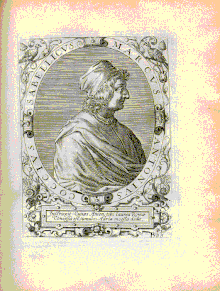Marcus Antonius Coccius Sabellicus: Difference between revisions
ext lk |
→Life: expand |
||
| Line 3: | Line 3: | ||
==Life== |
==Life== |
||
Born in [[Vicovaro]], his surname was originally Cocci; he took his [[Latinised name]] as a pupil of [[Pomponius Laetus]].<ref>p. 299; [http://books.google.co.uk/books?id=MhDq26Ua1tQC&pg=PA299 Google Books].</ref> |
Born in [[Vicovaro]], his surname was originally Cocci; he took his [[Latinised name]] as a pupil of [[Pomponius Laetus]].<ref>p. 299; [http://books.google.co.uk/books?id=MhDq26Ua1tQC&pg=PA299 Google Books].</ref> He studied also with [[Porcelio Pandone]] and [[Gaspar Veronese]].<ref name=CoE>Peter G. Bietenholz, Thomas Brian Deutscher, ''Contemporaries of Erasmus: a biographical register of the Renaissance and Reformation'', Volumes 1-3 (2003), pp. 181–2; [http://books.google.co.uk/books?id=hruQ386SfFcC&pg=RA2-PA181 Google Books].</ref> |
||
He became professor of eloquence at [[Udine]] in 1473, but was dismissed in 1482. After a short period at [[Verona]], he went to [[Venice]], with the Venetian history he had written speculatively.<ref name=CoE/> In 1487 he was appointed as a [[curator]] of the [[Biblioteca Marciana]]. |
|||
==Works== |
==Works== |
||
Revision as of 19:52, 5 January 2012

Marcus Antonius Coccius Sabellicus (1436–1506) was a scholar and historian from Venice. He is known for his universal history of 1504, Enneades sive Rhapsodia historiarum.
Life
Born in Vicovaro, his surname was originally Cocci; he took his Latinised name as a pupil of Pomponius Laetus.[1] He studied also with Porcelio Pandone and Gaspar Veronese.[2]
He became professor of eloquence at Udine in 1473, but was dismissed in 1482. After a short period at Verona, he went to Venice, with the Venetian history he had written speculatively.[2] In 1487 he was appointed as a curator of the Biblioteca Marciana.
Works
He wrote a Latin history of Venice, Historiae rerum venetarum ab urbe condita, with official encouragement; but it proved unpopular with the citizens.[3]
Notes
- ^ p. 299; Google Books.
- ^ a b Peter G. Bietenholz, Thomas Brian Deutscher, Contemporaries of Erasmus: a biographical register of the Renaissance and Reformation, Volumes 1-3 (2003), pp. 181–2; Google Books.
- ^ William J. Bouwsma, Venice and the Defense of Republican Liberty: Renaissance Values in the Age of the Counter Reformation (Berkeley, 1968), p. 90.
External links
